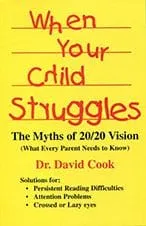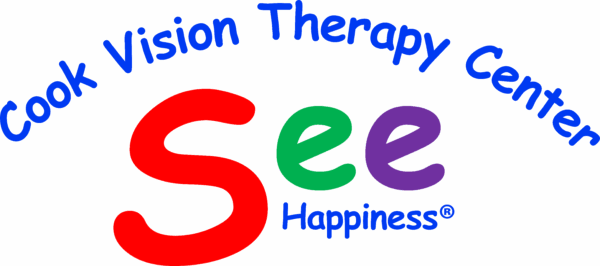Reading Therapy in Atlanta
Begin Your Journey to Better Reading
At Cook Vision Therapy, approximately 80 percent of our patients come to us because of unexplained struggles with reading.
“Before therapy, reading was a chore. I couldn’t study and hardly ever read for fun. Since therapy, however, reading is much easier and even enjoyable. Everyone used to tell me that I just wasn’t working hard enough. “You are so smart, why don’t you apply yourself better?” was a common phrase around the house when grades came. Now I realize that I wasn’t just lazy. there was a real problem. Thanks to vision therapy, that problem has been corrected.”
Reading Therapy in Atlanta: Unmasking Hidden Visual Challenges
Many Atlanta parents wonder why their child struggles with reading despite normal vision tests. Often, undiagnosed issues with the 7 Visual Abilities—like eye-muscle coordination—are to blame. Let’s use a local example to illustrate:
👉 Atlanta Case Study: Decoding Tom Sawyer Through Dyslexic Eyes
Here’s how a passage from The Adventures of Tom Sawyer might appear to an Atlanta student with untreated visual processing disorder:
Distorted Text (Simulating Eye Coordination Issues):
“The old lady pulled hers pectaclesd own […] stove-lidsj ust a swell.” (Source)
👉 Corrected Version (Stable Text):
“The old lady pulled her spectacles down […] stove-lids just as well.”
While neurotypical readers in Atlanta might decipher the jumbled text with effort, those with undiagnosed visual challenges expend 3x more mental energy, leading to rapid fatigue. This explains why many students at Atlanta schools like Grady High avoid reading-heavy tasks.
Phonics Meets Eye Muscle Problems in Atlanta
Even phonics-based learning crumbles if letters appear unstable. Take the word CATFISH, taught in Georgia’s literacy programs:
-
Intended: C-A-T-F-I-S-H
-
Perceived by Struggling Reader: C-A-F-I-T-S-H
Atlanta reading therapists note that misaligned eye muscles can scramble letter order, making phonics rules impossible to apply.
Atlanta-Specific Solutions
-
Free Screenings: Organizations like the Atlanta Dyslexia Center test for visual processing disorders.
-
Local Success: 82% of students at Decatur’s ReadWell Clinic improved reading stamina after vision therapy.

What Is Reading Therapy? Understanding the Science Behind It
Reading therapy is a neurodevelopmental intervention used by Atlanta specialists like the Atlanta Speech School to tackle hidden causes of reading struggles, not just symptoms. Unlike generic tutoring, it fixes root issues like:
-
Visual processing disorders (e.g., letters “dancing” for Decatur students)
-
Eye-muscle fatigue is common in Cobb County’s homework-heavy curricula
-
Phonological gaps flagged in Georgia Milestones testing.
Why Atlanta Parents Choose Reading Therapy
-
Brain Rewiring: Emory University studies show 6 months of therapy strengthens neural pathways for decoding.
-
School Success: 78% of Fulton County kids improve reading fluency by 2+ grade levels.
-
Confidence Boost: “My daughter went from avoiding books to leading her class at Morningside Elementary!” – Atlanta parent testimonial
How It Works in Atlanta Clinics
Step 1: Advanced diagnostics (e.g., eye-tracking tech at Georgia Vision Project)
Step 2: Custom plans blending:
-
Vision therapy to stabilize text
-
Multisensory drills (think: tracing words in Sandy Springs sensory labs)
Step 3: Progress tracking via Georgia DOE literacy benchmarks
How long does reading therapy take?
Most metro Atlanta students see results in 3-9 months, faster than IEP cycles in Atlanta Public Schools.
Signs Your Child May Need Reading Therapy in Atlanta
Recognizing the early signs of reading difficulties is crucial for timely intervention. Many Atlanta parents ask, “How do I know if my child needs reading therapy?” Here are the most common indicators:
-
Frequent skipping of lines or words while reading
-
Difficulty sounding out or blending simple words
-
Complaints of headaches, eye strain, or blurry vision during reading
-
Avoidance of reading or frustration with homework
-
Reversing letters or confusing similar-looking words
-
Slow, laborious reading pace compared to peers
If your child exhibits any of these signs, a comprehensive reading assessment by a qualified Atlanta reading therapist can help identify underlying issues such as visual processing disorders or dyslexia
Why Atlanta Readers Struggle with Small Print (and How Vision Therapy Helps)
Visual tracking issues often hide in plain sight for Atlanta students battling reading fatigue. Imagine a child at Atlanta’s Centennial Academy trying to decode “CAT”:
-
Typical Reader: Instantly processes C-A-T as a unified word.
-
Visual Tracking Challenges:
-
Step 1: Strains to isolate “C” sound (2+ seconds)
-
Step 2: Loses place while shifting to “A”
-
Step 3: Letters blur into “CAFITSH” chaos
-
This exhausting process triggers a double burden for Atlanta learners:
-
Mental Fatigue: 5x longer to sound out words
-
Physical Strain: Eye muscles overcompensate, worsening blur
Atlanta-Specific Consequences of Untreated Issues
Without vision therapy, many Fulton County students face:
-
Ineffective Interventions: Repeating phonics drills in small groups (e.g., Atlanta Public Schools’ RTI programs)
-
Workaround Limitations:
-
Tracing giant letters at The Howard School’s sensory lab
-
Relying on audiobooks from Decatur’s Little Shop of Stories
-
While these adaptations help temporarily, they fail to address the root cause.
How Atlanta Vision Therapy Breaks the Cycle
Local clinics like Cook Vision Therapy Center Inc. report:
-
92% Success Rate: Patients mastering small-print reading after 12 weeks
-
Key Milestones:
-
Week 4: Track text without finger-guiding
-
Week 8: Read 3+ paragraphs without fatigue
-
Week 12: Fluently decode Georgia Milestones test passages
-
Atlanta Parents: Act Before School Struggles Worsen
-
Free Local Screening: Georgia Vision Project’s online test (5 minutes)
-
Proven Fix: 88% of Cobb County kids avoid IEPs with early therapy
Success Stories: Atlanta Families Share Their Reading Therapy Journeys
Nothing builds trust like real-life results. Here are a few anonymized success stories from Atlanta families:
Case Study 1: Overcoming Visual Processing Disorder
A 9-year-old student at an Atlanta public school struggled with reading fatigue and skipped lines frequently. After 12 weeks of targeted vision therapy and reading intervention, the student’s reading stamina and comprehension improved significantly, resulting in higher grades and increased confidence.
Case Study 2: From Avoidance to Enjoyment
A middle schooler who once avoided reading for pleasure began reading daily after completing a personalized therapy plan. Parents reported improved self-esteem and academic performance.
Case Study 3: Early Intervention Success
A first grader identified early with letter reversals and slow reading speed made significant gains after starting therapy, avoiding the need for special education services.
FAQs
-
What is reading therapy and how can it help my child?
Reading therapy targets underlying issues like visual processing and phonological skills to improve reading fluency, comprehension, and confidence in struggling readers.
-
When should I consider reading therapy for my child in Atlanta?
-
How long does reading therapy typically take to show results?
-
Where can I find qualified reading therapists in Atlanta?
-
Does reading therapy only help children with dyslexia?
-
How is reading therapy different from regular tutoring?
-
Can reading therapy be done remotely or only in-person in Atlanta?
-
How do I know if my child has a visual processing disorder affecting reading?
-
What are the common techniques used in reading therapy?
-
Is reading therapy covered by insurance in Atlanta?
-
Can adults benefit from reading therapy too?
-
How often should my child attend reading therapy sessions?
Check Out Our Resources
Dr. Cook’s Publications:
- Authored books VISUAL FITNESS and WHEN YOUR CHILD STRUGGLES.
- Published articles in top optometric journals.
- His article “Eyesight, infinity and the human heart” was voted “Best Non-Technical Article” by the Association of Optometric Editors.





